The everyday parent.
- Mar 4, 2019
- 4 min read
I like to be in control of things. My daughter, Cassandra’s day of birth was the day I felt most powerless. As a Christian, the miracle of life remains lost on me. I remember feeling blessed, I remember feeling lucky, but most of all, I remember feeling utterly out of control. God’s power does that.
Nine months later, this feeling continues to come back to me. I would like to think that I am a proud father, and a good husband. The challenge of raising a child is in a parent’s inability to control the future and slowly, I have started to appreciate this. My wife, Nadege, and I always talked passionately about the possibilities that the world had to offer for our daughter. We talked, on end, about her future, and how much we would do to make sure everything worked out just fine. We felt empowered and able, but also remarkably lucky to raise a life.
However, the ‘everyday’ of parenting is perhaps my biggest lesson. The ‘everyday’ is that routine every parent knows about; the diaper changes, the dirty ‘jamas’, the unpredictable and overly scary movements as baby starts to discover motion and of course, the death of all possibility of schedule in your life. Cassandra radically changed our relationship. This is obvious, really. What was not obvious to me was just how much she would change our lives forever. I always knew that babies resonate towards their mothers, naturally. I, however, had to learn that there is an inert expectation of society that mothers are permanently in the state of ‘everyday parenting’; that mothers are primed to remain in a mental state of ‘mothering’.
My wife was tired. Living with the idea that she had to, by all means, be the ‘everyday parent’ had sucked the life out of her. My mental state was no better. Cassandra, being the first baby, served the misfortune of being our guinea pig in parenting. Mistakenly, I assumed that, if only we could split the ‘everyday’ parenting duties, and really work as a team – then maybe it could all work out just fine.
The lack of control of circumstances was frustrating. Even more so, the realisation that we somehow, were losing ourselves was more daunting. We had forgotten what it felt like to watch a movie together (albeit in the comfort of our home), or how to share a meal ‘in the present’, or even how to talk to each other without subconsciously feeling like every conversation was a parenting instruction. There was potential for backlash, but in the most subtle of ways: a daily reminder of sorts that first, you are a couple, then you are parents. I guess, in hindsight, this was necessary. I won’t say we were not panicking and trying to do our best. However, I could say that we were simply doing what parents do: following the non-existent playbook of “How to be a New Parent While At The Same Time Being A Good And Caring Spouse”.

As I came to learn, there was much more to it than just being that couple. I had to dig deeper and refocus on my wife’s mental state. It was imperative to create a space that allowed us to not only be parents; but also to be a couple. This meant that we had to simply find a way to do more things together, and to consider that Cassandra is a present part of us and our plans. If it meant that we were doing household chores together, we were a trio. If it meant driving to the supermarket, or bearing the dust and smells of Nakasero Market on Saturday morning, we were together. The most important decision we made was to simply do more things together.

Importantly, I had to recognise that while we are not fully in control of Cassandra’s future, we are here, every day, for her. Moreover, this role requires us to continually cultivate a mental and emotional space that thrives on our happiness as her parents primarily, a happiness that she feeds on and craves. Yes, mothers naturally play the most important roles in raising children, but children need that parenting balance of mother and father. It is the least that fathers can and should do.

For the fathers reading this: I will give you the cliché and then some. Yes, you have to be there, that is your responsibility. However, more importantly you have to participate. You have to recognise that from the time your child is born, the clock of bonding is ticking. And we can’t turn back the time. Every waking moment is a time for your child to know you, to learn you, and to learn to love you. This one is on us, boys.

About the author; Benjamin Mugema is a senior management consultant at Deloitte, a tennis enthusiast and currently a Commonwealth Scholar at Staffordshire University. Benjamin speaks four languages, enjoys writing and reading and is biased towards mathematics in an unhealthy way. He is married to the immaculate Nadege, and a father to Cassandra.



Comments